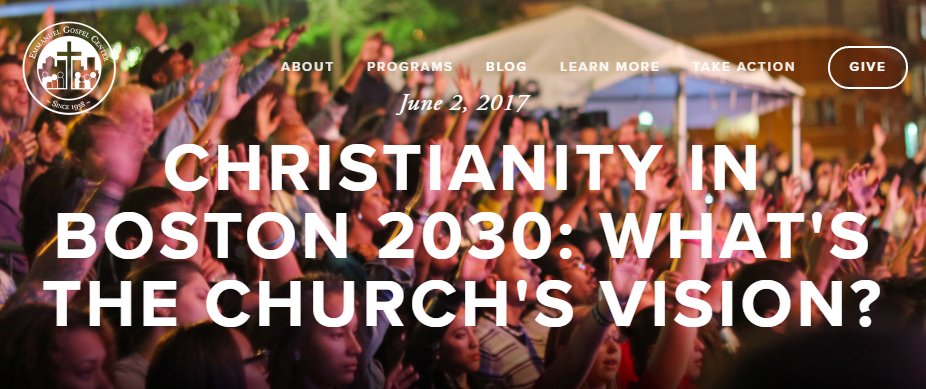Our friends at the Emmanuel Gospel Center recently released a blog entitled “Christianity in Boston 2030” that we’re reposting here! UniteBoston is all about Christians coming together to dream big with God about our city, so the Boston 2030 initiative is definitely something that we encourage Christians to get involved with.
The City of Boston has released “Imagine Boston 2030,” a comprehensive vision to prepare for an expected population surge by the city’s 400th anniversary in 2030. Can the church articulate a similar vision for what the Kingdom of God could look like in Boston 13 years from now?
Rev. Ralph Kee, veteran church planter and animator of the Greater Boston Church Planting Collaborative at EGC, thinks Boston needs dreamers. “God has a big dream,” he says, “and people have dreams. When people start to share their dreams, that builds enthusiasm.”
THE TASK AHEAD
Imagine Boston 2030 has articulated goals in the social, economic, cultural, and physical realms. Through the Prophet Jeremiah, God instructed exiled Israelites to “seek the peace and prosperity of the city to which I have carried you into exile. Pray to the Lord for it, because if it prospers, you too will prosper.” Urban Christians can seek the prosperity of our city and the success of these goals, finding ways to join in.
At the same time, we have the privilege and mandate to discern together goals and desires God has for our city.
Population growth alone should get our attention. With significant growth in Boston’s population recently and projected into the future, Boston’s churches will need to consider how to expand their outreach and service, as well as replication into new congregations.
Between 2010 and 2030, Boston could add from 84,000 to more than 190,000 new residents. Reaching and serving that many new people would require growing our present churches and planting new ones.
DREAM INNOVATION
What church solutions would best fit the city in the coming decades? More meeting spaces would be a must—though many new churches may never own a building.
New churches could take a variety of forms, including small groups, house churches, and cafe churches. Larger traditional churches could meet in a variety of traditional and nontraditional spaces and contexts.
A collaborative of churches could own or rent some multi-use space in Boston’s new neighborhoods. Some developers may already be creating community meeting spaces in new neighborhoods that could be rented by local church groups.
Can we start to envision the possible? What would it take to make the dreams happen?
“Should we convene Christians to talk about Boston 2030,” Ralph Kee asks, “including bankers, architects, real estate agents, construction executives? Can these leaders get together? The city is going to grow. Even what was Suffolk Downs is going to be a mini city. How are we going to get churches there?”
TAKE ACTION
What is your vision for Christianity in Boston in 2030? Would you weigh in by filling out a brief survey? EGC would love to hear from you!



Leave a Reply